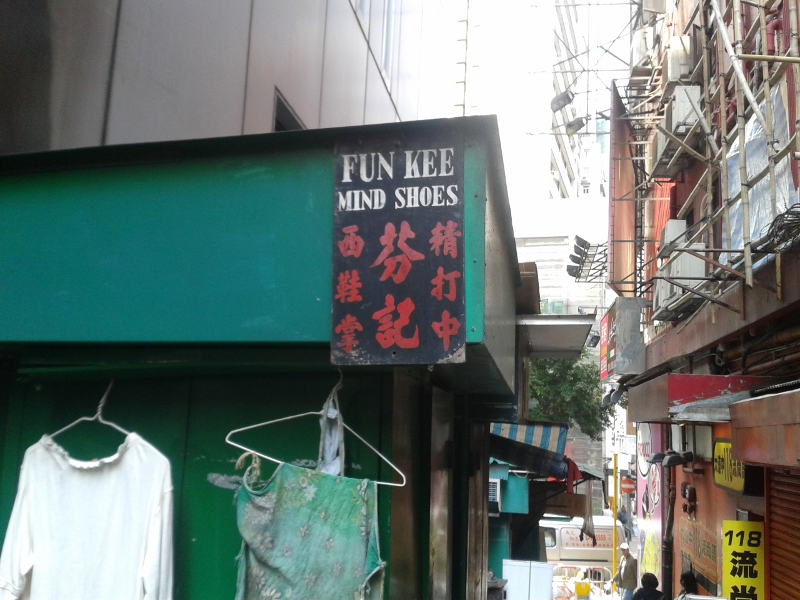Funky Mind Shoes
« previous post | next post »
Michael Johnson took this picture in Hong Kong between Queen's Road Central and the escalators:
FUN KEE
MIND SHOES
What??? Even when you read the Chinese, it doesn't immediately help appreciably to understand this MIND-boggling sign.
芬記
精打中西鞋掌
Fan1 Gei3
zing1 daa2 Zung1-Sai1 haai4-zoeng2
Expert repair of Chinese and Western shoe heels
Notes:
Fan1 Gei3 芬記 (lit., "fragrant mark / sign / brand") is just the name of this shop, though it doesn't seem to fit the cobbler business particularly well. I note, however, that it appears to be a favorite of small establishments in the Hong Kong-Macao area.
The first character on the right side of the sign is probably 精, though not clearly written. It means "proficient; skilled; fine; refined", etc.
The last two characters on the left side are haai4-zoeng2 鞋掌. Normally that would mean "shoe heel; heelpiece; heeltap", and this shop undoubtedly specializes in fixing heels, but may also work on soles, etc.
Now comes the big question: what in the world does "mind shoes" mean? Shoes for the mind? A couple of my correspondents who are native speakers of Hong Kong Cantonese and Hong Kong English thought that it might signify "attend to" or "take care of", hence "mind your shoes". Having spent a lot of time in Hong Kong, the first thing that crossed my mind, so to speak, was "mind the gap" (where "mind" means "pay attention to"), which is printed on the floor at the entrances to subway and train cars. (In Philadelphia, the train stations have "watch the gap" instead.) But that doesn't really make sense in this context.
Finally, when I wasn't even thinking about the problem, it came to me all of a sudden: "mind" = "mend"! This Fun Kee shop mends shoes.
[Thanks to Stephan Stiller, Abraham Chan, and Mandy Chan]

Stephan Stiller said,
April 18, 2014 @ 11:38 pm
1. The old work "A Tonic Dictionary Of The Chinese Language In The Canton Dialect" (英華分韻撮要) of 1856 writes 記 (there also with 巳 as the right-hand part, which we can safely subsume under graphemic variation of the time) as kíʾ, which would be gi3 in Jyutping transcription and [kiː] (no aspiration) in IPA. There is no Jyutping "gi" in present-day HK-Cantonese, and we normally have "gei" there. This would explain the English-orthography approximation "kee", which people might have copied from older signage.
2. The name 芬記 is interesting from a romanization perspective if we want to get rid of the space (though whether we would actually want to is not clear). Given that Jyutping uses tone numbers, what would be inconspicuous in Pinyin ("Fēnjì") looks a bit awkward in Jyutping ("Fan1gei3"). The Pinyin equivalent of Jyutping "Fan1 Gei3" (with a space) would be "Fēn Jì", and the Pinyin equivalent of Jyutping "Fan1-Gei3" (hyphenated) would be "Fēn-Jì". Jyutping "Fan1Gei3" has an internal capital letter, though due to the intervening number it doesn't look as unusual as "FēnJì". The problem is ameliorated by employing super- or subscript placement of tone numbers: Fan¹gei³, Fan₁gei₃. See also my earlier comments about lower-case letters following a hyphen in a capitalized name and details of Jyutping orthography.
Bob said,
April 19, 2014 @ 2:39 pm
in HK, all kinds of businesses named as XXX KEE, where XXX = owner's name, in a lots of cases. 芬 is usually a feminine name, but males can be named that too.
Bob said,
April 19, 2014 @ 3:10 pm
the interesting thing for me on this sign, is 中西鞋掌/Chinese,western, soles(heels). I thought Chinese style shoes (the kind wore by Bruce Lee in his movies) are made of cloth, including the soles/heels, and no one bother to have those re-sole. Perhaps, this is referred to shoes MADEIN CHINA.
Stephan Stiller said,
April 19, 2014 @ 3:12 pm
» Bob
The interesting part here is that the character before the 記 is normally a surname, and 芬 is not normally a surname. (A Cantonese dictionary of mine marking all sorts of rare surnames as such (incl ones which in my experience many people don't know exist as surnames), doesn't list the character 芬 as a 氏.) I think "X's Business" is indeed a good analysis, but 芬 would need to be construed as a character from a given name.
Bob said,
April 19, 2014 @ 4:22 pm
there is no rule that the owner only uses his/her last name for his/her shop/store/cafe/service. Since there are only limited numbers of Chinese last names, in order to avoid confusions, last names are not usually used.,…
note, CID of HK's police was nicknamed O-KEE (before 1997).
Matt said,
April 19, 2014 @ 6:36 pm
I'd've though that as a descriptor "Funky" would fit the cobbling trade better than most!